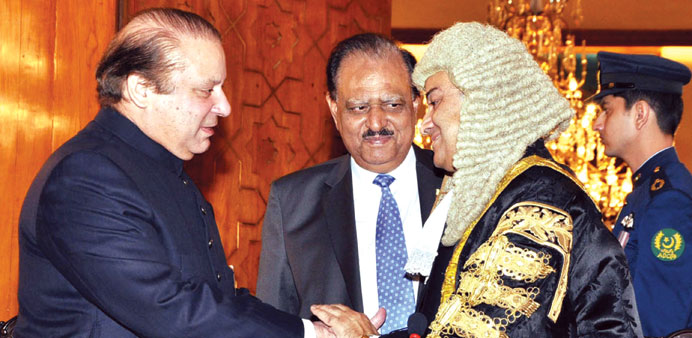Agencies/Islamabad
Pakistan’s new chief justice was sworn yesterday after signalling an end to years of judicial activism which have seen various Supreme Court decisions on political issues.
Nasir-ul-Mulk, 63, the supreme court’s most senior judge, took over as chief justice after his predecessor Tassaduq Hussain Jillani retired.
The judiciary became politically active after former chief justice Iftikhar Mohamed Chaudhry, who was sacked by the then-military ruler General Pervez Musharraf in 2007, was restored to office in 2009 following a country-wide movement by lawyers.
Chaudhry then took up several cases against the government and disqualified the then-Prime Minister Yousaf Raza Gilani on contempt of court charges.
After Chaudhry’s retirement in December 2013, his successor Jillani heard cases of public interest and individual complainants as a priority.
Mulk, who took the oath from President Mamnoon Hussain in the presence of Prime Minister Nawaz Sharif and his cabinet members, is expected to highlight the supreme court’s role as a constitutional body in harmony with other state institutions.
In a speech on Thursday marking his predecessor’s departure, Mulk said the judiciary should not allow “personal perceptions of justice” to interfere with decision-making, sticking instead to the law.
For Pakistan to run smoothly, he said, state institutions must work together.
“It is their (judiciary’s) constitutional duty to desist from undue interference in the functioning of other pillars of state,” he said according to a transcript released by the Supreme Court office.
The elevation of Justice Nasir-ul-Mulk as the top adjudicator of the country would mean advancing the legacy set out by his predecessor, retired chief justice of Pakistan Tassaduq Hussain Jillani, of exercising judicial restraint.
Members of the legal fraternity say the appointment will bring honour, dignity and a quiet grace, say.
Because, they say, Justice Mulk seldom interjects court proceedings with questions to the counsel unless necessary. A judge who never loses his temper, he extends equal opportunity to the lawyers, but is firm about not allowing the contesting sides to get sidetracked by entering the political arena.
When pressed to compare chief justice-designate Mulk with former chief justice of Pakistan Iftikhar Mohammad Chaudhry, a senior lawyer on condition of anonymity commented that ex-CJP Chaudhry was not driven by intellect or vision but by his ego he had a penchant for the petty exercise of power. Justice Mulk, on the other hand, will be “what a chief justice should be,” he added.
If former chief justice Chaudhry encroached upon the constitutional powers of the legislature and the executive, Justice Mulk believes in what he said recently: that structure in Pakistan can only be strengthened when all the institutions of the state work in accordance with the law and cautiously exercise the power held by them for the betterment of the people.
Justice Mulk has many challenges to face during his 13-month tenure because huge expectations are pinned on him given the political tensions in the country, observed rights activist Asma Jehangir.
“He has to remain non-bipartisan on civil-military relations,” she said. “That the biggest challenge Justice Mulk will have to deal with is tackling the legacy of former chief justice Chaudhry, which lingers.” “He is a good administrator and a disciplined judge who knows how to manage courts,” commented Advocate Hafiz S A Rehman. Justice Mulk belongs to Mingora. His father, Kamran Khan, was a businessman known for his philanthropic work in Swat.
The dapper Justice Mulk is fond of playing golf and is often seen taking constitutionals in the Margalla hills.

Prime Minister Nawaz Sharif greets newly appointed Chief Justice, Justice Nasir-ul- Mulk after the oath-taking ceremony at the Aiwan-e-Sadr in Islamab
